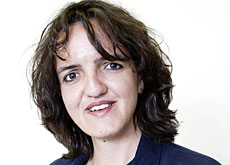Hobsbawm honoured in Bern
The British historian Eric Hobsbawm has been honoured in Bern with the prestigious Balzan prize.
Hobsbawm, who is 86, received the award for his analysis of European history in the 20th century.
The International Balzan Foundation awards four prizes each year for outstanding scientific and cultural achievements.
Other recipients of this year’s awards were Serge Moscovici, the Paris based social psychologist; the German physicist Reinhard Genzel, and the genetics specialist Wen-Hsiung Li, who is professor of ecology and evolution at the University of Chicago.
The Foundation, which has its headquarters in Zurich and Milan, is funded from the legacy of Eugenio Balzan (1874 -1953), an Italian born journalist who in 1933 fled fascism in Italy to settle in Switzerland.
Prize money
The Balzan prizes come with a cheque of SFr1 million, half of which must be invested in projects undertaken by young academic researchers.
Hobsbawm, who could not personally attend the award ceremony in Bern for health reasons, explained what he intended to do with the money over a telephone link.
“The proposition is for a three-year research project on the years immediately after the Second World War”, he explained. “How ordinary civil life recovered on the continent of Europe, after a period of total destruction.”
The subject matter is a logical one for Hobsbawm, whose most recent academic works include “The Age of Extremes 1914 – 1991”, regarded as one of the most brilliant analyses of 20th century history.
Communism
Hobsbawm, the son of an Austrian mother and an English father, has devoted most of his career to the study of European history. He was also for many years a keen supporter of communism, a subject his audience in Bern was eager to ask him about.
“Yes I was a communist for a long time,” Hobsbawm said. “And I don’t regret it. You have to remember that for my generation things looked rather different.”
Hobsbawm was also asked how he viewed the emergence of the United States as the world’s sole superpower.
“I think America is just not strong enough to be the world’s only superpower,” he said. “And I suspect that over the next few years the US will grow weaker economically, and possibly politically and culturally as well.”
He added that US intervention in Iraq had greatly complicated an already very difficult situation in the Middle East.
“I believe that the idea of exporting a particular type of democracy to an area of the world which is completely different makes absolutely no sense.”
Hobsbawm pointed out that his book “The Age of Revolution” offered a fairly accurate view of the events now unfolding in Iraq.
“I wrote that there was no difficulty for a rich and militarily powerful nation to win any battle they wanted in the world anywhere,” he explained.
“The real problem would arise when the battle had been won – what do you next? The civilian population is no longer prepared to accept foreign interventions and foreign governments in the way they did in the 19th and 20th centuries, and this is one thing that’s being discovered at the moment.”
Swiss neutrality
Hobsbawm praised Switzerland for its policy of neutrality, saying it set the country apart.
“Switzerland… is an island, if you like, of sanity and stability in the world. And from the point of view of the world that is an enormous asset.
“I agree that, for instance, being neutral in the Second World War was a very difficult thing, and no doubt total neutrality was impossible. Nevertheless the Swiss have maintained their neutrality, and they are perhaps the last country in Europe to do so.”
“I believe it is a mistake for every country to abandon neutrality… and to join international interventions,” he added.
Eternal optimist
Despite Hobsbawm’s clear concern over the current state of the world, and his thorough study of the violence and upheavals of the 20th century, he remains hopeful for humanity.
“I think we need to hold on to the idealogy of the Age of Enlightenment,” he said. “The idealogy that believed in the innate rationality of humanity, and of the possibility of improvement.
“The concept that we can systematically and rationally improve our world sprang from that ideal, as did all progressive political movements – socialism, liberalism, and even communism.”
swissinfo, Imogen Foulkes
Four Balzan prizes are given out each year. They aim to honour outstanding achievements in science and culture. The specific fields of study are redefined each year.
This year specialists in European history, social psychology, genetics and astronomy received prizes.
A Balzan award brings prize money of SFr1 million, half of which the winners must spend on new research projects.
Next year’s Balzan prizes will reward outstanding work in the subjects of the Islamic world in the twentieth century, prehistoric archaeology, epidemiology, and mathematics.

In compliance with the JTI standards
More: SWI swissinfo.ch certified by the Journalism Trust Initiative

You can find an overview of ongoing debates with our journalists here . Please join us!
If you want to start a conversation about a topic raised in this article or want to report factual errors, email us at english@swissinfo.ch.